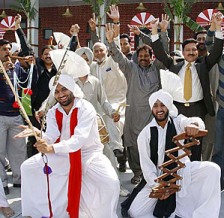Punjab - Culture
Throughout the ages Punjab was a crucible of culture. An unending amalgamation of communities and confluence cultures took place resulting in a pragmatic, experimental and utilitarian outlook on life and a robust common-sense view which debilitated the root of all sorts of dogmas, conventions and conservatism. Arab Muslims under the leadership of Mohammad Bin Qasim raided Sind and Multan in 713 AD; that was Punjab's involvement with the next phase of military, political and cultural conflicts. Other armies from West and Central Asia followed over the next 1000 years. The Ghoris, Mongols and Ghaznavids swept across the Khyber Pass and down into Punjab to plunder, but they were not interested in establishing their rule and staying in the country permanently. During this convulsive period the Natha mendicants kept alive the cardinal spirit of India. The clash of cultures was also responsible for the birth of the Sufi tradition.
Khwaja Moinuddin Chisti, one of the greatest of the Sufis, arrived at Lahore in 1190. Farid-ud-Din Ganj-i-Shakar (1 173-1265) is the first Sufi poet, who wrote in Punjabi – then a sort of North Indian lingua franca. It was an amalgamation of Hindi and Multani. Other Sufis like Shah Hussain, All Haider and Ghulam Farid identified themselves with what is commonly termed as Punjabiat, and sang in the language of the land the songs of love, humanity and God.
 |
 |
The Punjabi Culture is reflected in its folk dances , folk songs , arts and crafts . Punjab deserves praise for its hospitality and assimilative power . In addition to the Hindus , Muslims and Sikhs, the numerous ethnic groups that came to Punjab have contributed to the growth of its composite culture . The rich cultural heritage of Punjab gives a clarion call to peace and prosperity.
The Punjabis are known the world over for their dash, daring and dynamism . Their innate resilience has helped them overcome one crisis after another. An openness and a readiness for restructuring an individual and collective levels have been the essence of Punjabi life- style , the core of Punjabiat. Gandhiji considered Punjab the most important province of India . It is richly endowed with the bounties of nature . It is intersected by seven perennial rivers joined by innumerable tributaries . These rivers and their tributaries spread juicy carpets of alluvial soil on its vast plains.